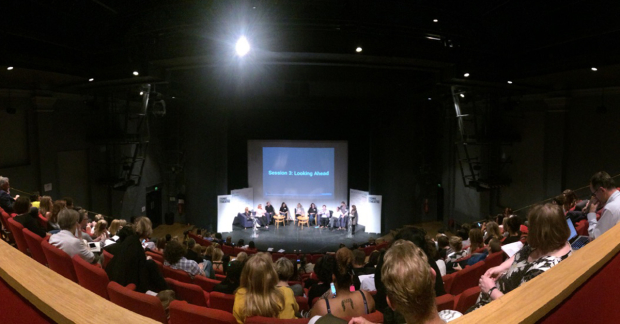Sarah Crompton: Theatre is as capable of gender equality as any other industry

© Paul Westwood
There’s a lot of talk about gender equality in the performing arts at the moment. But there isn’t always a lot of action. So one of the most refreshing things about this week’s symposium on gender equality organised by Tonic Theatre was that although there was a lot of chat, some of it described changes that are actually happening. Aspiration is becoming reality. It was a stimulating afternoon.
I was there at the invitation of WhatsOnStage's COO, Sita McIntosh, who is Chair of the Board of Trustees of Tonic Theatre, an organisation set up specifically to inject a dose of energy into solving some of the issues involved. Their Advance programme, now in its second incarnation, seeks to work with organisations to help them resolve specific questions – and in doing so, to raise and address some broader concerns.
All the details of what the 2016 programme looked like (and a description of the 2014 version) are on their website. They worked with nine organisations, from ballet, opera and dance, and each investigation began with a question. For example, Northern Stage asked how they could better support small female-led companies in the region, Sadler’s Wells asked what challenges women faced in sustaining a career in choreography and how to address them, and Mahogany Opera questioned why there were so few female librettists and whether they needed more encouragement.
'The fascinating thing was that the research Tonic has undertaken revealed common threads of difficulty
Similar questions about the active encouragement of women in fields where they are under-represented were asked by the Royal Opera House (support for women conductors) and Northern Ballet (encouragement of women creators within classical ballet). But CAST, Clean Break and the New Wolsey Theatre wanted to explore the ways their organisations are run, to check women and their needs were properly represented. The National Theatre raised something very specific and crucially important: did the way it communicates internally and its meeting structure impede its ambition to work effectively with women.
The fascinating thing to me was the way that the research Tonic has undertaken and the workshops it has held with the different organisations – including use of a gender tracker which precisely shows areas of strength and weakness – revealed common threads of difficulty. Among these were the way women often feel they are working on the periphery and are not at the centre of decision-making; the extra fragility of women’s careers in an already unstable sector; the sense that they are held back by organic decision making which tends to perpetuate the status quo.
The symposium was held at the Royal Central School of Speech and Drama and involved some 155 participants. As the discussions continued on stage and across an audience that was itself encouragingly balanced between men and women, I noticed a few things. The first was the way in which the experience of women speaking from the floor exactly replicated the pattern of the research; they may have encountered specific difficulties but there were common themes of exclusion and frustration.
'The focus on gender equality opens up other possibilities, new avenues for exploration'
The second, most notably, was how many men and many organisations, are increasingly becoming aware of how important unconscious bias is in affecting decision-making. That realisation – that everyone, male and female, must hold their own thought processes up to the light – has huge implications. Combined with many of the structural changes that the Advance programme is enabling organisations to begin to effect, it could make a massive difference. A public willingness to counter inequality is, in itself, a major first step for change.
Rachel Tackley, now executive director of Chichester Festival Theatre, pointed out that when she led English Touring Theatre who took part in Advance 2014, the act of saying publically that ETT productions would never again have an all-male creative team meant it happened. Faced with the huge question of gender inequality, the important thing was to start somewhere. "Pick something small, do it and take people with you so they buy into it," she said.
Chris Haydon, artistic director of the Gate, pointed out that they had included their commitment to gender equality in the contracts they offer freelance directors. "They don’t realise how much of a force for change they can be," added Clare Slater, now of the Donmar, formerly of the Gate.
Such conclusions were part of the motivational power of the day; the sense that something can be done if only there is a commitment to doing it. Near its close, Michael Duffy, communications manager of Mahogany Opera Group, said the process of exploring the involvement of women in opera had made him realise the way in which the stories we tell ourselves about culture always follow similar lines, often conditioned by history and practice. If the future is to be more diverse in every way, then we have to look at those stories – and consciously begin to change them.
In that way, the focus on gender equality opens up other possibilities, new avenues for exploration. The performing arts, I think, are as capable as any other area of society of getting stuck in custom and practice. The idea that change requires everything to be questioned, feels like a breath of very fresh air.










